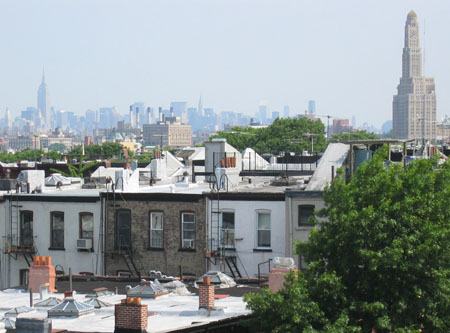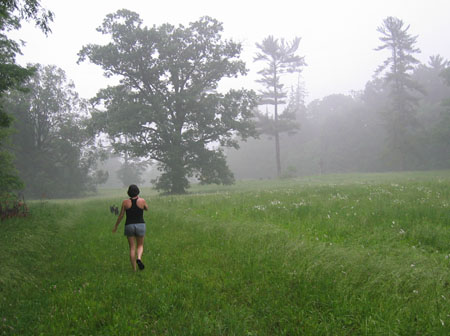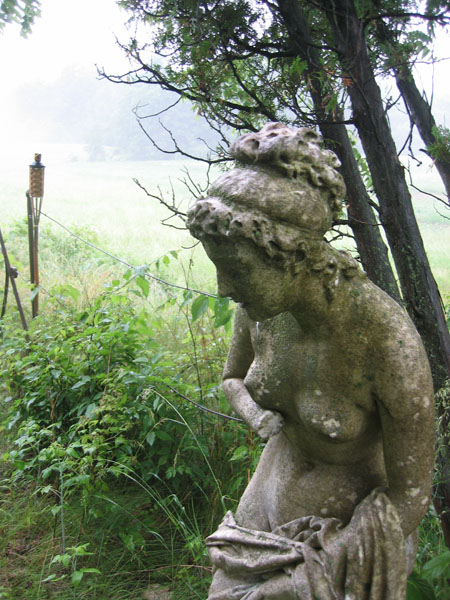|
|
|
gay pride versus basketball
Sunday, June 12 2005
After a fitful night of airconditioned sleep in Ray and Nancy's apartment, Gretchen and I went to visit David the Rabbi and his wife Lynne in their coop apartment, which was not even a block away on 6th Avenue. I was kind of interested in seeing the place, if only to know what a half million dollar property looks like these days in the Slope (David's parents' house, being a full multi-floor brownstone, is obviously worth much more, perhaps two or three million).
Their apartment is on the top floor of a four floor walkup. There's a tendency among people living in this particular building to use the hallway outside their apartments for additional storage. This is fine for David and Lynne on the top floor, but it tends to restrict travel in the hallways further down.
There are two advantages to being on the top floor: good views and more or less exclusive access to the roof. Getting to the roof of David and Lynne's apartment required climbing a steep ladder-stair, a tricky job when carrying a full cup of coffee and a bagel. Once you've emerged from what seems like a manhole, you find yourself on a reasonably spacious deck, where Lynne is cultivating a rather extensive garden of flowers, herbs, and vegetables. Given the urban landscape, it's an ambitious agricultural operation, one benefitting from full sunlight and water pumped up a hose threaded through a ventilation duct. In today's oppressive heat one would expect to get hot from all the sun, but this can be blocked by an umbrella and, being so high up, there's usually a good breeze blowing.
While we were there eating our breakfast and drinking our coffee, we had a rather intense conversation about "what it all means" - you know, life, etc. It all began where Gretchen and I had left off in a conversation we'd had during our drive down, one about whether humans were any more cruel than nature itself or is it just that we're aware and should know better. My contention had been that most people who are cruel to animals aren't really any more "aware" than a mantis eating the head of her husband. Most cruelty isn't sadistic; it either has an important function or it's a side effect of an attempt to attain some other goal. And it's easy to think of ourselves as being gifted with continuous awareness, but much of the time we're really not as aware as we think. What is awareness anyway? Why do we have it? What does it all mean?
David is a Rabbi, so, when he's not, say, presiding over Yom Kippur services (no matter the level of his blood sugar) these questions are his business. David's view of "God" is vague enough that he doesn't get much in the way of argument with even aspiritual people like us. As it turns out, though, my view of consciousness and the nature of reality is as different from Gretchen's as either is from David's. Our respective belief systems each hinge on the significance of a different part of the Freudian Structural model.
For David, there is a meaning behind the world, and it's both good and bad, unpredictable and mysterious. From the way he described it, and its influence on human morality, it sounded to me like he was describing the Freudian superego. It drives us to do right and wrong, but David seems convinced that the origin of these drives will always be a mystery.
As for Gretchen, she found consciousness (the ego) the most important and interesting mystery. She thinks consciousness and feelings will never be fully understood or emulated - they're an intriguing gift as well as a terrible curse.
From my perspective, we have a lot less free will than we think. We're mostly on autopilot, the id, sticking tightly to patterns etched in our chromosomes and in our culture by the harrowing process of surviving many ordeals where most others perished. Still, to me there's nothing special or mysterious about any of the things that others find holy. The feeling of love makes perfect sense as a survival adaptation for a creature responsible for raising its own offspring and living in family groups. "Thou shalt not kill" makes sense as a basis for societies that persisted (as opposed to those that did not). Even our own consciousness could be construed as an elaborate trick of the brain to allow us to model our own behavior in the context of an environment and social groups. There's mystery behind these things mostly because we feel so deeply about them. But that doesn't make them gifts unique to our condition; I have confidence that all of these things can be emulated on a sufficiently powerful computer, giving most of what we feel to cold heartless computer programs.
Later the conversation turned to television shows, at which point Lynne discontinued her abstinence from the conversation and jumped in with enthusiasm. All agreed that, despite what is often said, television has been improving over the past several years. Now not only HBO has good, intelligent shows - so do basic cable channels and even broadcast networks. Of particular note was Veronica Mars, which David and Lynne recommended highly but which neither Gretchen nor I had ever heard of.
Today was the day of New Paltz's first ever gay pride parade, but it had a schedule conflict with something else Gretchen wanted to do: attend a New York-Detroit women's basketball game at Madison Square Garden. In the end Gretchen decided to attend the New Paltz parade because she didn't think she'd be able to enjoy being a cryptofan for Detroit at the New York home stadium (her loyalty switched from New York to Detroit two years ago or so).
But we were slow in leaving the City and arrived in New Paltz late, somewhat after the parade. We ended up at the post-parade rally as Jason West, New Paltz's young mayor, was giving one hell of a speech. Occasionally his cadence reminded me of Martin Luther King, and the crowd loved him. (For those who don't remember, New Paltz was the first non-San Francisco city to marry gay couples, all because Jason was willing to do the solemnizing.) By now Gretchen was famished, but no one had thought to erect any sort of food vending stall. About the only thing available to eat was Wheat ThinsTM, boxes of which were being raffled off to benefit some gay-friendly cause.
This evening Gretchen and I did the usual Sunday night Red Hook Curry House buffet thing, followed by another rainy walk with the dogs at Poet's Walk. This time, though, we took a side trail and went through a gate to the north, ending up at a great stone mansion surrounded by scruffy cars of various ages. We didn't know we'd left the Poet's Walk grounds and were a little mystified by what this house represented. Its front door was wide open and Sally and Eleanor both went inside briefly. Later we saw some young guy go out to his car for something and he didn't seem to care one way or the other about us. Given all these things, we concluded that the mansion must be some sort of housing for Bard students.

Looking towards Manhattan from David and Lynne's roof. On the right is the Whilliamsburgh Bank building, the tallest in Brooklyn. On the left is the Empire State Building, the tallest in Manhattan.

Looking up Park Slope from David and Lynne's roof.

Gretchen with Sally and Eleanor on the trail leading away from Poet's Walk.

A statue near the mysterious stone mansion just north of Poet's Walk in Dutchess County, NY.
For linking purposes this article's URL is:
http://asecular.com/blog.php?050612 feedback
previous | next |



